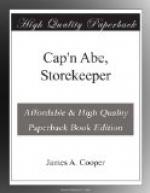“Of all things!” ejaculated Mr. Tapp. “You are always making some kind of a fool of yourself, Lawford. Don’t, for pity’s sake, be that kind of a fool.”
“What do you mean, dad?” and now the young man’s eyes flashed. It was seldom that Lawford turned upon his father in anger.
“You know very well what I mean. Keep away from such women. Don’t get messed up with actor people. I won’t have it, I tell you! I am determined that at least one rich man’s son shall not be the victim of the wiles of any of these stage women.”
The flush remained in Lawford’s cheek. It hurt him to hear his father speak so in referring to Louise Grayling. He, too, possessed some of the insular prejudice of his kind against those who win their livelihood in the glare of the theatrical spotlight. This gentle, well-bred, delightful girl staying at Cap’n Abe’s store was a revelation to him. He held his tongue, however, and held his temper in check as well.
“I don’t see,” stormed I. Tapp, “why you can’t take up with a nice girl and marry. Why, at your age I was married and we had Marian!”
“Don’t you think that should discourage me, dad?” Lawford put in. “Marian is nobody to brag of, I should say.”
“Hah!” ejaculated his father. “She’s a fool, too. But there are nice girls. I was talking to your mother about your case last night. Of course, I don’t want you to say anything to her about what I’m going to tell you now. She’s got the silliest notions,” pursued Mr. Tapp who labored under the belief that all the wisdom of the ages had lodged under his own hat. “Expects her daughters to marry dukes and you to catch a princess or the like.”
“There are no such fish in these waters,” laughed Lawford. “At least, none has so much as nibbled at my hook.”
“And no nice girl will nibble at it if you don’t come ashore once in a while and get into something besides fisherman’s duds.”
“Now, dad, clothes do not make the man.”
“Who told you such a fool thing as that? Some fool philosopher with only one shirt to his back said it. Bill Johnson proved how wrong that was to my satisfaction years and years ago. Good old Bill! I wanted to branch out. We had just that one little candy factory and I worked in it myself every day.
“I got the idea,” continued I. Tapp, launched on a favorite subject now, “that my balance sheet and outlook for trade might impress the bank people. I wanted to build a bigger factory. So I took off my apron one day and walked over to the bank. I saw the president. He looked like a fashion plate himself and he swung a pair of dinky glasses on a cord as he listened to me and looked me over. Then he turned me down—flat!
“I told Bill about it. Bill was kind of tied up just then himself. That was before he made his big strike. But he was a different fellow from me. Bill always looked like ready money.




